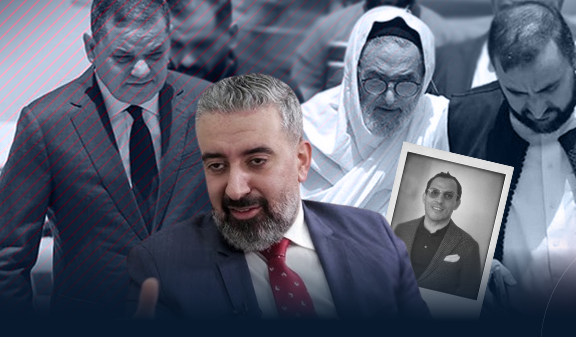Mohamed Shaaban recounts a “sensitive call” between Ibrahim Dbeibeh and Suheil al-Gharyani: A list of people to be released includes “ISIS” and “Al-Qaeda”… and an alleged American reprimand.
Background of the Post
Libya’s former ambassador to Damascus, Mohamed Shaaban, published a post on his Facebook page titled “It Actually Happened,” in which he detailed what he said was a call that took place between the National Security Advisor of the Government of National Unity, Ibrahim Dbeibeh, and Suheil al-Gharyani, son of the deposed Mufti Sadiq al-Gharyani.
Content of the Call According to Shaaban’s Account
Shaaban reported that Ibrahim Dbeibeh informed Suheil al-Gharyani that the government could no longer continue disbursing budgets for the Dar al-Ifta, after it had — in Dbeibeh’s words — “implicated them” by having them report the existence of “innocent prisoners” held by the Deterrence Apparatus, based on a list of names the Dar had provided.
The List of 56 Names and the “Deterrence” Apparatus’s Response
According to the account, the Prime Minister of the Government of National Unity, Abdul Hamid Dbeibeh, handed the list — containing 56 names — to Deputy UN Envoy Stephanie Koury to request their release. However, the investigations office of the Deterrence Apparatus responded that 50 names on the list were “elements of the ISIS organization” and 6 were from “the Al-Qaeda organization,” providing “proof” showing they were among the “most dangerous terrorists” and were facing the counter-terrorism prosecution. This placed Koury and the mission in an “embarrassing position,” as Shaaban reported.
Alleged American Reprimand and Financial Repercussions
Shaaban adds that Ibrahim Dbeibeh received an American “reprimand,” and that he informed them he had received the names from the “Mufti’s” office. According to the account, he then received an angry American message stating: “Does this mean the Mufti supports obscurantist groups and is using you to get them out? Whoever finances these people is considered their partner.” Ibrahim is then said to have notified Suheil that while “personal” requests might be possible, “official” ones would no longer be disbursed after this incident, neither by Prime Minister Abdul Hamid Dbeibeh nor by the Central Bank Governor, Naji Issa.
